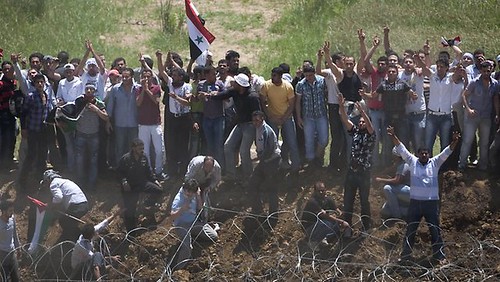
Palestinians in the Israeli-occupied Golan Heights demanding the right of return. Numerous Palestinians were reportedly killed on the border with Syria., a photo by Pan-African News Wire File Photos on Flickr.
Latest update 01:57 06.06.11
Violence on Syria border leaves Israel in a no-win situation
Unlike on Nakba Day, the Israel Defense Forces were prepared for Naksa Day clashes; IDF prevents Syrian protesters from crossing border into Israel
By Amos Harel and Avi Issacharoff
Haaretz
There's a major difference between what happened yesterday, on what the Arabs call Naksa Day, the anniversary of the beginning of the Six-Day War, and Nakba Day last month, marking the displacement of Arabs when the State of Israel was established. Most significantly, this time the Israel Defense Forces was prepared for clashes at the Syrian border and in the Golan Heights.
The Northern Command wasn't surprised this time by Syrian protesters attempting to cross into Israel; its preparation prevented them from breaching the border. But the difference in readiness had little effect on the cost in human life. As on May 15, Arab protesters were killed yesterday by IDF fire.
A cautionary note is necessary. The IDF has no real way to estimate, in real time, the number of fatalities on the other side. But the Syrian government - through its media - has a clear interest in exaggerating the number of casualties to have the border incidents overshadow Syrian President Bashar Assad's ongoing massacre of anti-government protesters.
Just yesterday, according to opposition forces, at least 35 Syrians were killed by their own security forces during protests in the north. Over the weekend, more than 70 were killed across the country.
It was difficult to take seriously the accusations on Syrian television of an Israeli massacre while, day after day, the deaths caused by the Syrian government are ignored. Apparently at least some of the fatalities in the Golan Heights yesterday were injured by a fire in the Golan town of Quneitra a few hundred meters from the border and were not directly related to the IDF.
All the same, the Israeli approach seemed designed to be self-defeating. The IDF is trapped between two contradictory goals: preventing the border from being breached and Israeli sovereignty from being impinged upon (though that is controversial in itself, as the rest of the world doesn't recognize the Golan as Israeli land ), and keeping enemy casualties to a minimum when civilians are involved.
To the extent that yesterday's clashes can be judged, the Northern Command by and large retained control over events. Snipers fired at the legs of those who attempted to breach the border fence or were identified as "primary inciters" in the rally.
Unlike on Nakba Day, the Palestinians were saving their energy for future clashes. At least for now, the population of the West Bank doesn't seem particularly enthused about the possibility of a third intifada. However, if Israeli security forces take a hard line in the territories, that's likely to change significantly.
The differences between the Syrian front and the Palestinian front are directly related to the various interests of the Syrian and Palestinian leaders. Assad is desperate to heat up the border, while the Lebanese leadership isn't interested in taking unnecessary risks that could harm tourism.
As long as Syria sees continued confrontations as a way of diverting international pressure from Damascus, the clashes could continue over the next few weeks.
As September and the Palestinian bid for statehood approach, presumably there will be other additional clashes - as riots, rallies at border fences, flotillas or even protest flyovers.
No comments:
Post a Comment